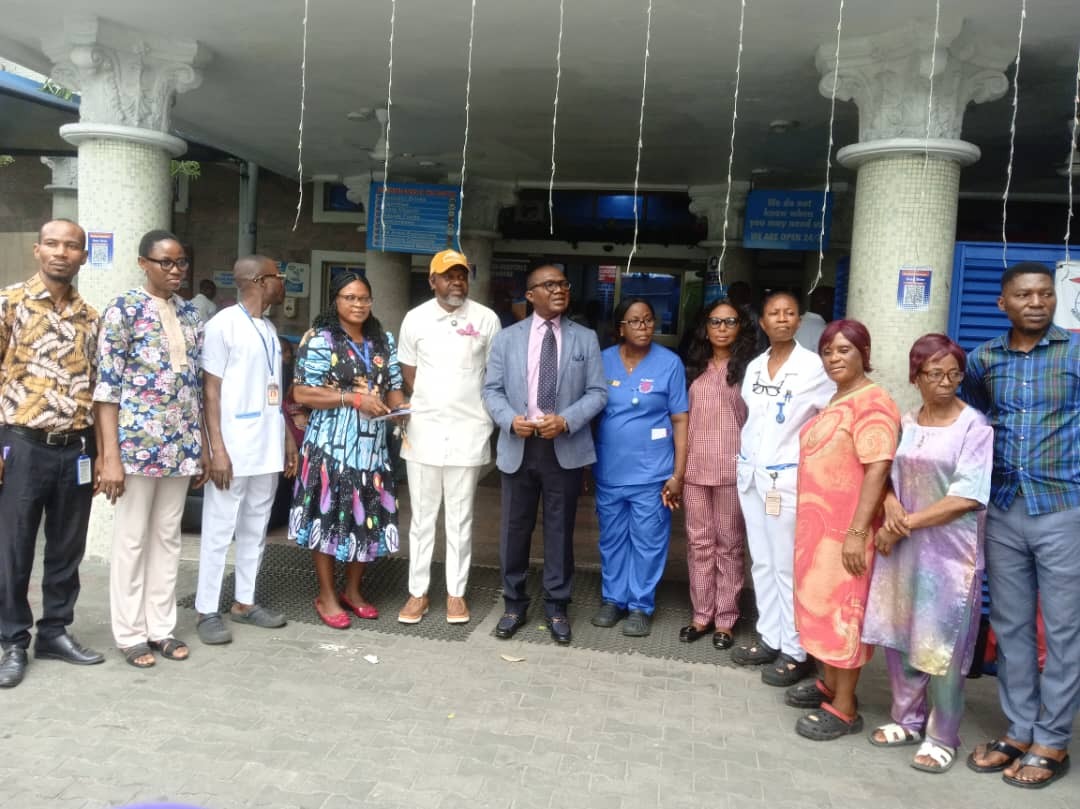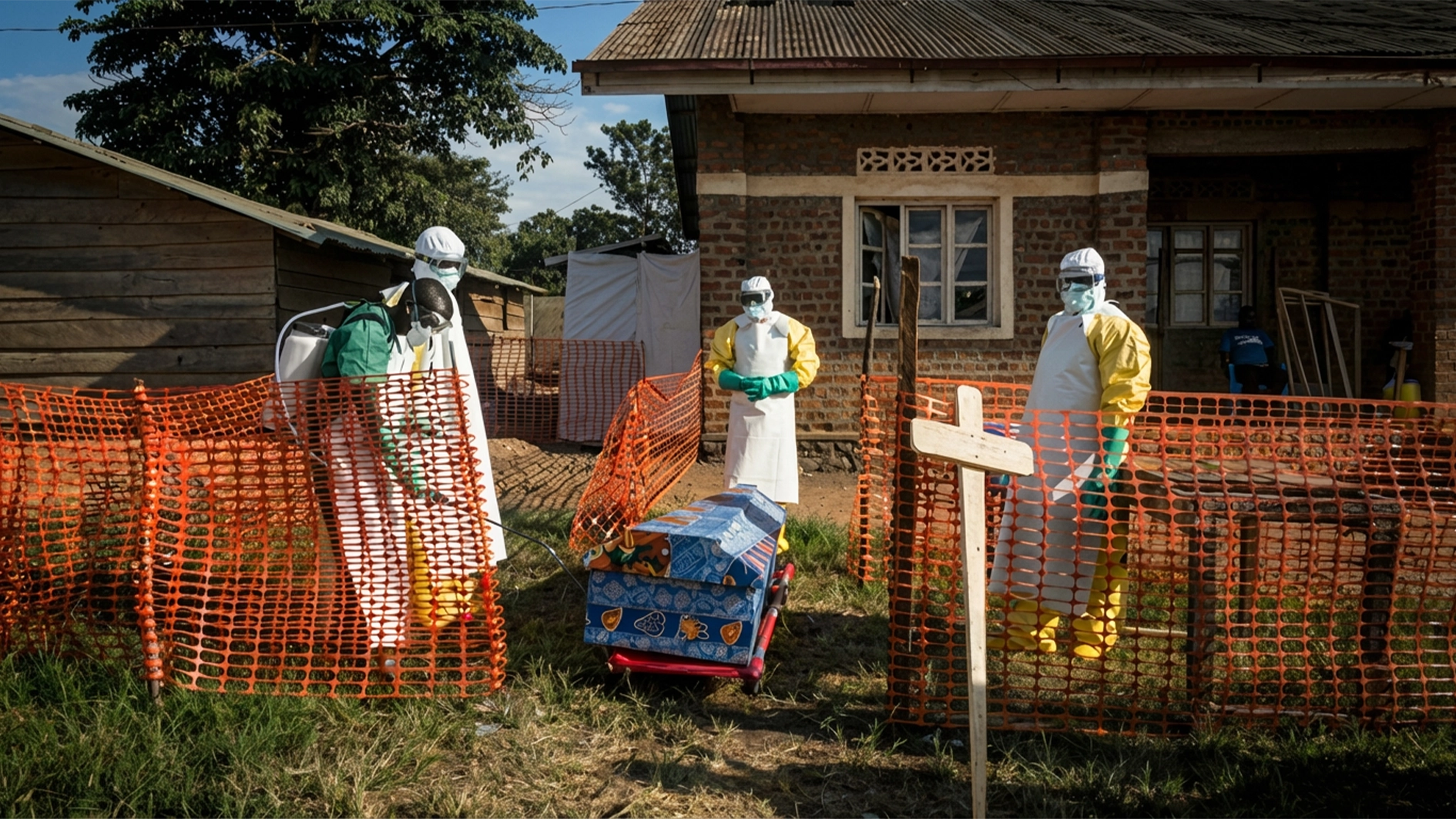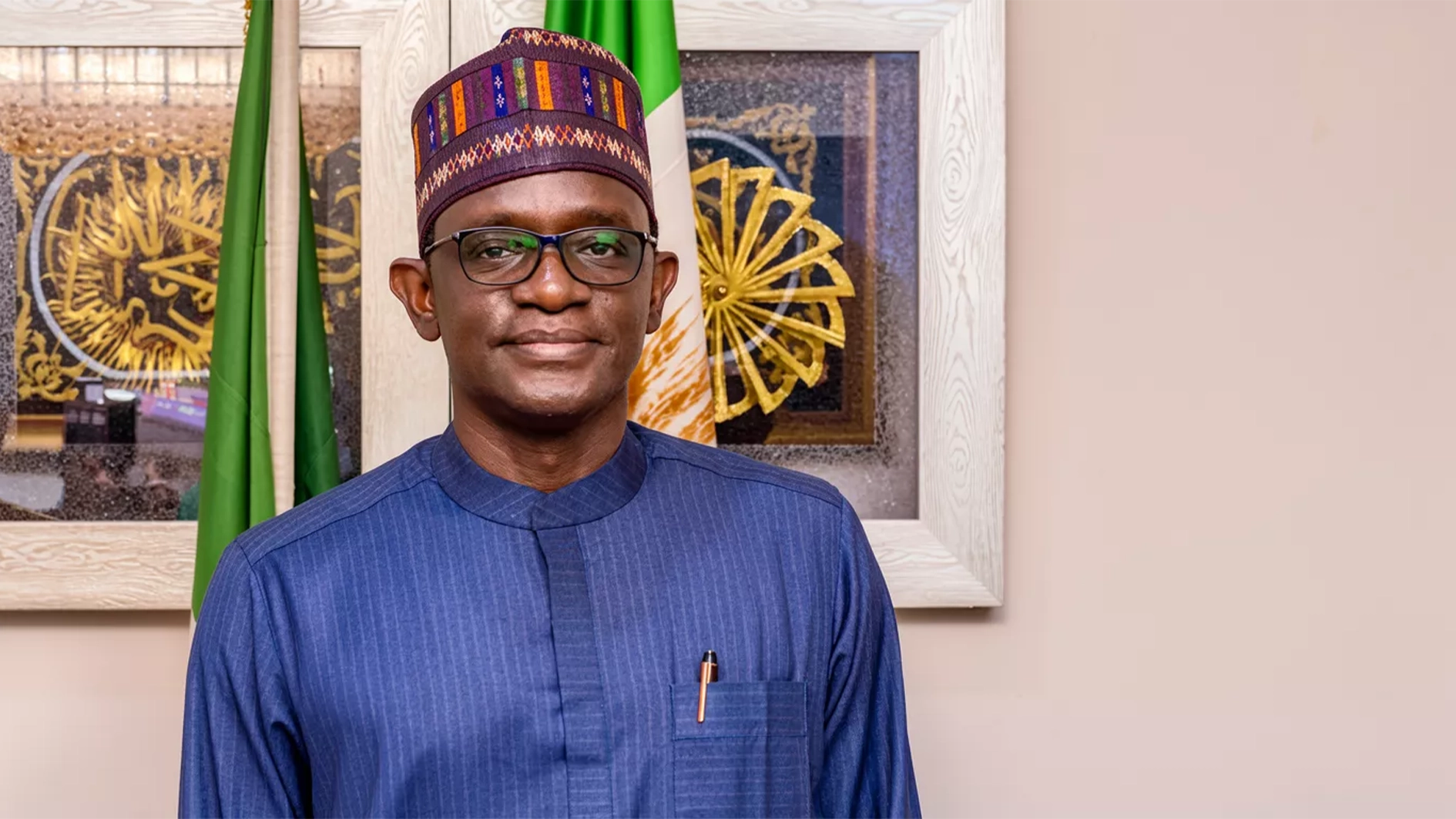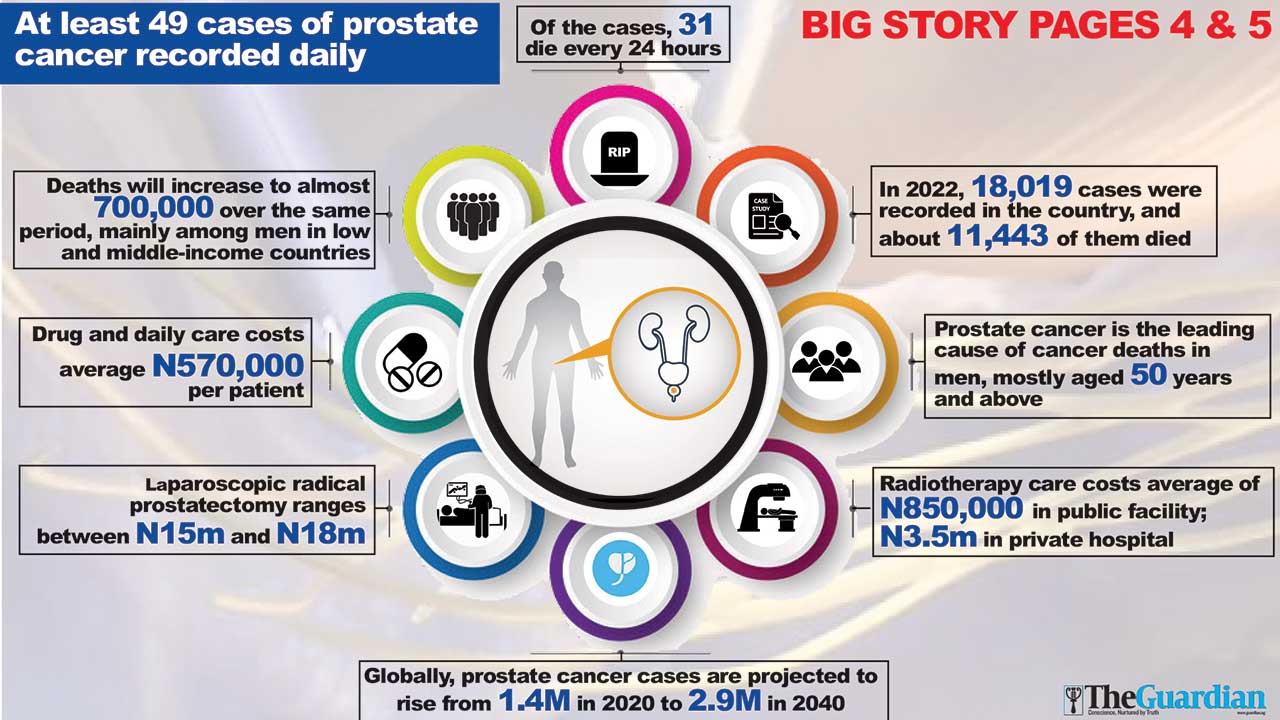 Nigeria is grappling with a silent epidemic. Prostate cancer, the most common malignancy among men, is striking at a devastating proportion. With a staggering 49 new diagnoses and 31 deaths daily, the disease is imposing both a retching and wretched burden on individuals, family finances and a healthcare system in dire straits. United in agony, both patients and practitioners are calling for a stronger healthcare safety net to ease those pains in the balls when they occur and ultimately decrease the body count, NKECHI ONYEDIKA-UGOEZE reports.
Nigeria is grappling with a silent epidemic. Prostate cancer, the most common malignancy among men, is striking at a devastating proportion. With a staggering 49 new diagnoses and 31 deaths daily, the disease is imposing both a retching and wretched burden on individuals, family finances and a healthcare system in dire straits. United in agony, both patients and practitioners are calling for a stronger healthcare safety net to ease those pains in the balls when they occur and ultimately decrease the body count, NKECHI ONYEDIKA-UGOEZE reports.
Seventy-year-old Fidelis Ebu’s world came crashing down around him when the words “prostate cancer” echoed through the hospital corridors, shattering his very existence.
The biopsy results had confirmed his worst fears, leaving him gasping for breath as if the weight of the diagnosis had physically crushed him.
At that moment, Ebu’s mind was consumed by the dark spectre of death, as the cancer diagnosis seemed like an inescapable sentence. Tears streamed down his face as he thought of his loved ones, his legacy, and the life he had yet to live.
But then, a glimmer of hope flickered to life. His doctor’s reassuring words cut through the despair: “Your condition can be treated with surgery”.
Ebu’s heart clung to those words like a lifeline, and with a deep breath, he steeled himself for the battle ahead, his faith in God his only solace.
As he prepared for the surgery, Ebu’s thoughts were consumed by the daunting financial burden ahead. The crippling cost of cancer treatment in Nigeria loomed over him like a dark cloud, threatening to destroy not just his body but his family’s financial stability as well.
Ebu’s story is a heart-wrenching testament to the human cost of cancer in Nigeria, where the fight for life is often reduced to a desperate struggle for financial survival.
He told The Guardian that after being diagnosed with prostate cancer, he had to sell his car and raise funds from friends and colleagues to save his life.
Ebu said: “The tests alone cost over N250,000, while surgery was over N3 million. I was spending an average of N38,000 every month on drugs.”
Prof. Peter Ebigbo has a similar tale to tell. He narrowly escaped cancer at almost stage two. There was a variation in his prostate-specific antigen (PSA) that steadily rose year after year from 4.1 to 9.1, and he had to go for a surgical operation that gulped millions of naira. After his surgery, his PSA was down to 0.23, and the value has remained the same eight years down the line.
But undeterred, Ebigbo, who sees his survival as a miracle, has pledged to devote the rest of his life to prostate cancer advocacy by educating men on how to prevent it.
The survivor, who narrated how he tried to live in denial despite overwhelming evidence from his PSA test that something was wrong, emphasised that early medical checkup is important to prevent a possible death sentence.
Ebigbo, a Consultant Clinical Psychologist at the Department of Psychological Medicine, University of Nigeria Teaching Hospital, said prostate cancer diagnosis and treatment come with a substantial financial burden, while a lot of men are hesitant to check.
Ebigbo noted many people think that they should keep their medical conditions secret, which should not be so.
“Right from my mid-40s, I was working hard, eating very well and had a very self-confident stance on issues. I was also smoking cigarettes and having enough drinks to achieve a balanced good feeling with the drink. I was warned to stop smoking and eat less to reduce weight.
“This health consciousness made me stop smoking and start going for medical check-ups, especially when I read that black people are prone to prostate cancer, and every black man should start checking his prostate from 40 to 45 years old.
“As a survivor, I can say that over the years, my PSA varied between three and four. Then, suddenly, I had 4.5, but the doctors said it was within the norm. The next year, the value went up to 5.1; the following year, the value went up to seven. I managed to deny it as it had reached a dangerous range and argued with my son. He let me go that year. The following year, the PSA rose to 9.1.
“My children begged me to see a doctor, and my son took me to an oncologist. Upon looking at my lab results, the professor asked me to take further tests if I wanted to live. She said the PSA was not so high as such, but there was a variation that steadily rose year after year from 4.1 to 9.1, and therefore, she suspected a growth in my prostate.
“That was how I narrowly escaped cancer at almost stage two. After the operation, my PSA was down to 0.23. Eight years after the operation, the value has remained the same,” he added.
A heavy burden below the belt globally
PROSTATE enlargement and cancer are the most frequent ailments diagnosed in men. Statistics from Project Pink Blue, a cancer organisation engaged in cancer awareness, free cancer screenings, and support to people battling with cancer, showed that at least 49 are diagnosed with prostate cancer in Nigeria, with about 31 of them dying from the disease.”
In 2022, 18,019 cases were recorded in the country, and about 11,443 of them died.
The spike in cases of prostate cancer in Nigeria, coupled with the high cost of diagnosis and treatment, is putting a huge financial strain on patients and families diagnosed with the ailment.
 With low health insurance coverage and the rising cost of drugs, it has become more financially stressful to cope with the burden of cancer cases in Nigeria.
With low health insurance coverage and the rising cost of drugs, it has become more financially stressful to cope with the burden of cancer cases in Nigeria.
Though the exact cause of prostate cancer is not yet known, several factors can increase the risk of developing the condition. These include age, ethnicity, family history, genetic factors, diet, smoking, and other risk factors.
Prostate cancer, according to the American Cancer Society, is a form of disease that begins in the gland cells, the prostate, which is found only in males.
The prostate is a small walnut-shaped gland in males that produces the seminal fluid that nourishes and transports sperm.
Several reports show that in Nigeria, prostate cancer was the leading cause of cancer deaths in men, mostly aged 50 years and above.
There are claims that the risk increases as one gets older, as most cases are diagnosed in men over 50 years of age.
In terms of race, prostate cancer is more common in black men, while inherited features may increase the risk. Mutations in these genes also increase the chance of breast cancer in females, too.
Besides, there are reports that men who eat a lot of dairy products and calcium have a slightly higher chance of getting prostate cancer, while active and passive exposure to cigarette smoke are considered carcinogenic for many human cancers.
According to the Lancet Commission, prostate cancer cases are expected to double worldwide between 2020 and 2040. Prostate cancer is both the most common and most deadly cancer in men with 32·8 cases and 16·3 deaths per 100 000 men.
Yearly prostate cancer cases are projected to rise from 1.4 million in 2020 to 2.9 million in 2040, while deaths would increase to almost 700,000 over the same timeframe, mainly among men in low and middle-income countries.
Why is prostate cancer on the prowl?
CHIEF Consultant Urological Surgeon at the National Hospital, Abuja, Dr Isiaka Lawal, confirmed an increase in prostate cancer cases in recent times.
He noted that in the past, close to 95 per cent of patients with prostate cancer were not detected early enough, and when they eventually did, the cancer would have spread to other parts of the body.
Lawal hinged the rising cases on increased access to prostate-specific antigen (PSA), unlike it used to be in the past. “So, people now go for PSA, and it’s usually the first thing to be detected even when patients are not having any symptoms.
“That is to say, one can have prostate cancer without any symptoms. You only get to know if you submit your specimen for analysis and they discover that your PSA is high, then we begin to evaluate and eventually do a biopsy to confirm that there is prostate cancer.”
The physician noted that this testing tool has helped increase early hospital presentation and diagnosis, leading to better treatment outcomes and cures.
He further submitted that more awareness campaigns about cancer and prostate diseases have led to the rise of men coming to the hospital for diagnosis and treatment, even before they have symptoms.
Although he noted that the exact cause of cancer is not known, Lawal said certain factors increase the risk of prostate enlargement and cancer more than others.
“The male factor itself is a risk factor because every man has a prostate gland. However, it is not every man who has a prostate gland that will develop prostate cancer. Age is another risk factor, in the past, it used to be shared in the elderly, from 70 years and above, but now, we see it in men who are 50 years old.
“It means that as one advances in age, for men, the risk increases. That is the normal, natural process. But not everybody will come down with symptoms of that enlargement,” the physician noted.
He further added that more awareness campaigns about cancers and prostate diseases have led to the rise of men coming to the hospital for diagnosis and treatment even before they have symptoms.
High cost of treatment
“WHEN you have prostate cancer, it’s an expensive disease. Whether it is surgery or radiation or hormonal therapy, they are quite expensive,” Lawal said.
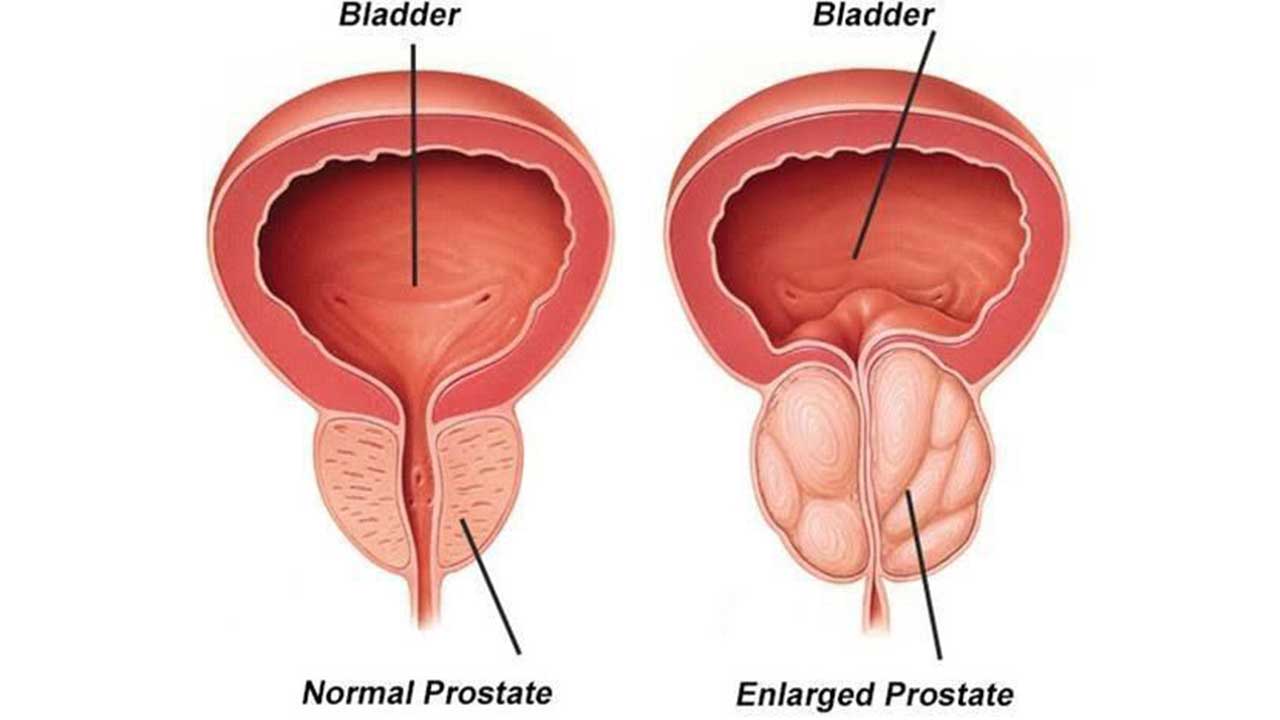 As a result, he noted that many patients cannot afford their treatment, calling for government intervention in terms of funding or subsidy to reduce the burden of treatment costs.
As a result, he noted that many patients cannot afford their treatment, calling for government intervention in terms of funding or subsidy to reduce the burden of treatment costs.
According to him, the cost is more expensive when the cancer is at an advanced stage. Lawal said the outcomes are better if detected early enough as the surgery is still affordable.
He stated that open surgery and radiotherapy are treatment options for early detected cases.
“For the early disease, it simply means that the prostate cancer has not gone out of the prostate. It is still confined within the prostate. We will have done other tests like Magnetic Resonance Imaging and CT scan to check the status of other body parts, and there is a conclusion that it has not affected other parts of the body. That is what we call early cancer of the prostate.
“So, what are the treatment options for cure? First is operation. The operation is to remove not only the prostate but also seminal vesicles, which are attached to the prostate. We now reconstruct a way for urine to come out of the bladder. That is what we call radical prostatectomy or radical surgery generally.”
Other forms of less invasive and technologically enhanced techniques for radical prostatectomy are laparoscopy and robotics.
The consultant urologist further explained that patients unfit or who reject surgery have the option of radiotherapy, “which is an artificially generated radiation directed to the site of the cancer to kill the cancer cells.”
For the management of late-detected cases, he mentioned the use of hormonal therapy, which was to remove or counteract the effect of the male hormones, androgens, feeding the cancer. However, when initial treatments fail, chemotherapy and other drugs are introduced.
“That is why it is best when the patient comes early. It is expensive but still affordable. And the good thing about the surgery is that it is just once.”
Radiotherapy is a bit expensive, but it is given once. For instance, Lawal puts the cost at between N800,000 to N900,000 at the national hospital. In private facilities, it costs about N3m to N4m, while the average cost for laparoscopic radical prostatectomy is about N15 million to N18 million.
For instance, Zoladex injection administered once every three months costs N300,000, while the daily tablet amounts to N90,000 monthly. This means that a patient would require about N570,000 every quarter for treatment.
“There are newer drugs now in the market. They are efficacious, but they are quite expensive. You can imagine a tablet costing about N500,000 and using it for one year or 18 months,” he added.
Nigeria Cancer Health Fund to the rescue?
THE Nigeria Cancer Health Fund (CHF) was established to support and ensure the affordability of cancer treatments for patients at treatment centres. With the low uptake of health insurance in Nigeria, which also does not offer comprehensive cancer care coverage, many patients are unable to bear the out-of-pocket costs associated with their treatment.
In 2020, Roche led a private-sector coalition, which, with the support of the International Finance Corporation (IFC) and Nigerian public authorities, led to the establishment of CHF. The fund’s goal is to give indigent patients access to treatment and strengthen the national cancer care ecosystem by improving the quality of service.
However, transparency in the administration of the fund is lacking. A psychologist and Executive Director of Project Pink Blue, Runcie Chidebe, lamented that the major challenge confronting cancer patients is the lack of funds for treatment, as between N3m to N10 million is required. According to him, this is why many resort to crowdfunding to raise funds.
“How many Nigerian men can pay this money from their pockets to get treated? Cancer treatments are not cheap; Nigerians are crowdfunding to get money to pay for their treatments. Some men are diagnosed with prostate cancer in their mid-life or later life. For those diagnosed at mid-life when they are still active with work life, paying for treatment may be easy, but for those who have retired, it is usually a big challenge.”
Chidebe observed that until health insurance is prioritised, Nigerians would continue to suffer from the financial burden of cancer and other diseases.
Regarding the accessibility and effectiveness of CHF, Chidebe said the fund is no longer transparent as the number of beneficiaries and treatment costs are unknown.
“We do not know how many cancer patients have benefitted from this fund, who and where they are. Who are the people deciding who gets the funds? Are cancer patients part of the decision-making process? Nigerians should know where and who is benefitting from this fund. She said that this issue has marred the capacity of other non-state actors and private sectors to support the fund,” she said.
In a chat with The Guardian, the Director-General of the National Institute for Cancer Research and Treatment (NICRAT), Prof. Usman Aliyu, said the Federal Government has piloted the CHF and Chemotherapy Access initiative to treat indigent cancer patients.
He observed that over one million cancer patients have benefitted from the fund, adding that the government is re-strategising the model of the CHF to make it more effective and robust while processes are ongoing to transfer both the CHF and the cancer access initiative programme to NICRAT.
Aliyu added that the institute has drafted a five-year strategic plan for the country containing guidelines on conducting awareness programmes and providing all diagnostic treatment services.
Besides, he said the Federal Government is providing more cancer centres to ensure easy access to early diagnosis and treatment, while the institute is working with an international organisation on improving prostate cancer treatment.
The NICRAT boss disclosed that the Federal Government has concluded plans to launch a robust cancer screening programme for all Nigerians, adding that efforts are being made to establish preventive oncology clinics in the six geo-political zones.



